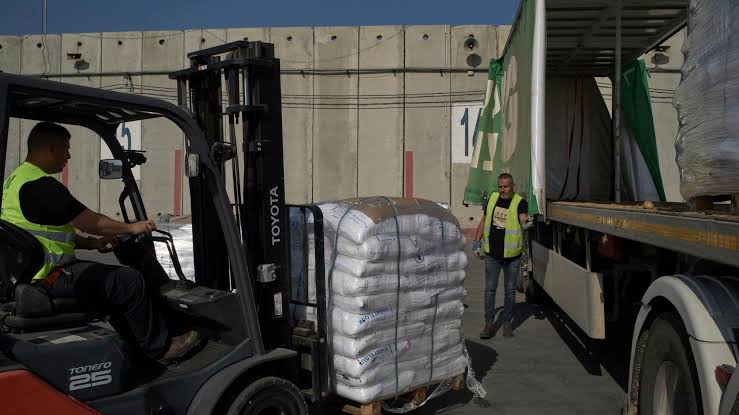United Nations teams have collected over 90 truckloads of humanitarian aid from the Kerem Shalom crossing into Gaza, following a three-day delay caused by security concerns along the approved route.
The deliveries, which included essential supplies such as flour, baby formula, and medical equipment, were transported to storage facilities for distribution late Wednesday. Visuals shared with the BBC showed a bakery using the newly arrived flour to produce fresh bread.
According to the UN, the delay in collecting the aid stemmed from safety concerns along the only authorized route, which aid agencies said exposed their teams to potential attacks from desperate civilians and armed groups.
While Israeli authorities said they permitted an additional 100 truckloads through the Kerem Shalom crossing on Wednesday, the UN emphasized that the aid was “far from sufficient” to address the escalating humanitarian needs of Gaza’s 2.1 million residents. Humanitarian organizations continue to report critical food shortages, surging prices, and alarming levels of malnutrition—particularly among children.
A recent assessment by the UN-backed Integrated Food Security Phase Classification (IPC) warned that roughly 500,000 people in Gaza face the risk of famine in the coming months.
World Food Programme (WFP) official Antoine Renard explained that the market value of a truckload of flour in Gaza has soared to approximately $400,000 due to the extreme scarcity. He stressed the urgency of deploying “hundreds of trucks daily” along safe corridors to prevent further deterioration of the situation, warning that limited supplies increase desperation and risks on the ground.
Renard also noted that aid agencies do not use armed escorts due to safety risks, and called for an extended ceasefire to enable continuous aid delivery.
Israel had halted all aid and commercial shipments to Gaza on March 2 and resumed military operations two weeks later, ending a ceasefire with Hamas. Israeli authorities said the move aimed to pressure Hamas into releasing the 58 hostages still held in Gaza, though only 23 are believed to be alive.
While Israel has claimed that Hamas diverts humanitarian supplies for its fighters—a claim the group denies—the UN maintains that no aid has been misappropriated and asserts that Israel remains obligated under international law to ensure the civilian population receives essential aid.
More aid convoys passed through the Kerem Shalom crossing on Thursday, yet the overall volume remains inadequate. Prime Minister Benjamin Netanyahu stated that allowing limited aid into Gaza is intended to avert a humanitarian crisis while enabling Israeli forces to continue their operations.
Netanyahu also endorsed a controversial U.S.-Israeli aid plan that would sideline the UN and utilize private contractors and Israeli troops to distribute food from secure hubs. The UN and other agencies have rejected this proposal, arguing that it undermines humanitarian principles and places undue burden on civilians who would be forced to travel long distances for food.
“This is not a humanitarian solution—it’s a political maneuver,” Renard said. “Food should be delivered to people, not people forced to seek it out.”
Meanwhile, Israeli military operations persist across Gaza. The Hamas-run health ministry reported that 82 Palestinians were killed within a 24-hour period. The UN estimates that 81% of Gaza is now under evacuation orders or considered militarized zones, with nearly 600,000 people displaced since March—161,000 of them within just the last week.
The conflict, which erupted following Hamas’s attack on Israel on October 7, 2023, has so far claimed the lives of at least 53,655 people in Gaza, according to the territory’s health authorities. Hamas’s attack resulted in 1,200 Israeli fatalities and the capture of 251 hostages.

